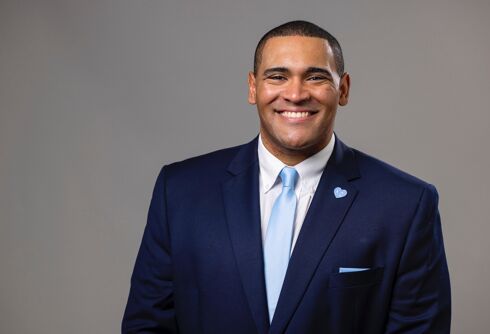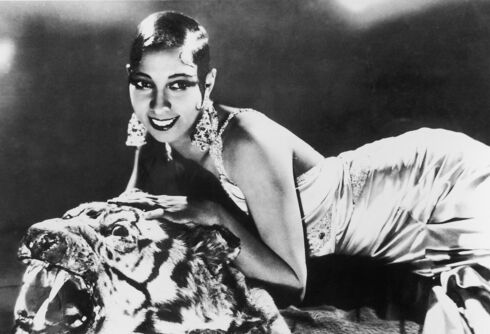This Valentine’s Day, I pay homage to W. E. B. Du Bois’s 1924 novel, Dark Princess, because it highlights the least talked about subject then and now: Black love.
Two activities converged for me during Covid-19: When not officiating funerals, I read romance novels and took long walks along the Charles River, thinking about sociologist W. E. B. Du Bois – the first African American to receive a Ph.D. from Harvard University – as a romantic.
Related:
It’s time to give the middle finger to our oppressors & elect more Black trans leaders
By electing Black trans leaders, we create a domino effect of positive change that benefits society as a whole.
During my morning constitutional, I intentionally passed 20 Flagg Street, where Du Bois resided from 1890 to 1893 as a doctoral student because of the university’s segregated housing policy prohibiting Black folks in the dorms. Since 1994, thanks to then-Mayor Reeves (the first gay and Black mayor of Cambridge), the house is part of the Cambridge African American Heritage Trail. The Cambridge Historical Commission placed a marker on the front yard to commemorate Du Bois’s life.
Never Miss a Beat
Subscribe to our newsletter to stay ahead of the latest LGBTQ+ political news and insights.
During the pandemic, I happened upon a romantic novel by Du Bois titled Dark Princess, A Romance Novel. I was in disbelief. Du Bois said of his body of works that this was his favorite. Because the book was on sale on Amazon as a Kindle ebook for $2.99, I thought, what did I have to lose? Moreover, the thought of Du Bois having written a romance novel didn’t fit the image of the man I learned about in college.
Du Bois was born three years after the American Civil War in 1868, and he died one day before the historic March on Washington in August 1963. He is known as one of last century’s preeminent scholars on African-American life. Known as Willie to family and friends, Du Bois spent his formative years in the Berkshire community of Great Barrington, Massachusetts, approximately a two and a half hour drive from Boston. I wonder if it was during his time in Great Barrington, with less than thirty African American families, that the seed of his concept of “double consciousness” began to take root when he depicted his 1903 seminal and autoethnographic text The Souls of Black Folk.
Dark Princess was written in 1924 during the Harlem Renaissance. This cultural and artistic movement promoted Black America’s causes, hopes, dreams, and genius through icons like Langston Hughes, Zora Neal Hurston, and James Weldon Johnson.
Dark Princess was Du Bois’s effort to showcase Black love while illustrating his concept of the “problem of the color line” at home and abroad and the need for solidarity across races. While the book shows that Black and Brown lives globally are constantly challenged, it also highlights that we must find time for joy, love, and celebration as a radical act of liberation.
The protagonist, Matthew Townes, an aspiring obstetrician student, is told that because he’s African-American, he’ll not be permitted to treat white patients, bringing the opportunity to complete his studies to a halt. With shattered dreams, Townes goes to Berlin, where he meets Kautilya, a Southeast Asian princess who’s the daughter of Maharaja of Bvodfur. While Kautilya educates Townes about the struggles all people of color confront globally against white supremacy, a romance blooms between them, and they marry.
African-American life in the U.S. is primarily depicted as a struggle devoid of romantic love rather than a radical act of living, liberation, and loving families. Under the tyranny of colonization, slavery, Jim Crow, and simple everyday life, how do we have time for romance? To put a softer racial spin on the subject, I’ve been asked, as a people who are so fixated on freedom, do we have the capacity for romantic love?
In addition, we are bombarded by negative images and racial tropes that depict Black women as emasculating, mammies, and welfare mothers and Black men as “super-predators,” pimps, and roving phalluses. Thus, the perception is Black people don’t engage in romance. Instead, we have sex; we make babies.
Du Bois concludes the novel with the birth of Townes’s son, showing love exists in Black and interracial families, both taboo topics until Mildred Loving fought the Supreme Court in Loving v. Virginia in 1967.
Loving is often overlooked in the pantheon of African-American trailblazers celebrated during Black History Month. She gained notoriety when the Supreme Court decided in her favor that anti-miscegenation laws are unconstitutional. Married to a white man, Loving and her husband were indicted by a Virginia grand jury in October 1958 for violating the state’s Racial Integrity Act of 1924, the same year Du Bois’s novel appeared.
Loving understood the interconnection of struggles and supported the same-sex marriage fight. Today, we are free to marry who we want. Black LGBTQ+ couples have rights thanks in part to Du Bois, who led the way with his novel, and Loving, who challenged the law. Both iconic figures illustrated what Black love, and families really look like.
Don't forget to share:















